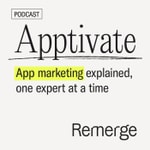Apptivate: App Marketing Explained – Details, episodes & analysis
Podcast details
Technical and general information from the podcast's RSS feed.

Apptivate: App Marketing Explained
Remerge
Frequency: 1 episode/11d. Total Eps: 216

Recent rankings
Latest chart positions across Apple Podcasts and Spotify rankings.
Apple Podcasts
🇨🇦 Canada - marketing
17/07/2025#55🇫🇷 France - marketing
23/05/2025#70🇫🇷 France - marketing
22/05/2025#56🇬🇧 Great Britain - marketing
03/05/2025#76🇩🇪 Germany - marketing
05/03/2025#72🇩🇪 Germany - marketing
21/02/2025#77🇨🇦 Canada - marketing
17/02/2025#100🇨🇦 Canada - marketing
16/02/2025#61🇫🇷 France - marketing
31/01/2025#86🇫🇷 France - marketing
30/01/2025#47
Spotify
No recent rankings available
Shared links between episodes and podcasts
Links found in episode descriptions and other podcasts that share them.
See all- https://www.draftkings.com/
1217 shares
- https://lancaric.me
207 shares
- https://www.hellofresh.com/
202 shares
RSS feed quality and score
Technical evaluation of the podcast's RSS feed quality and structure.
See allScore global : 58%
Publication history
Monthly episode publishing history over the past years.
CTV and the next frontier in app growth marketing - Peter Hamilton (Roku)
Episode 197
mercredi 18 septembre 2024 • Duration 29:26
Could streaming be the next big channel for mobile marketers? Peter Hamilton, Head of Ad Innovation at Roku believes it will be. In this episode, he chats with Taylor about how action ads work on Roku – where viewers can place orders or download an app directly from their TVs. He also discusses their newest product for advertisers called ‘Roku Ads Manager’. Targeting and measurement with CTV just got a whole lot better. Tune in to the episode and find out how.
Questions Peter answered in this episode:- What does Head of Ad Innovation mean? And what innovations are happening at Roku?
- How do you make the ads relevant to the viewer?
- How do action ads work? And what impact have you seen from allowing viewers to place orders directly from their tv?
- Is there anything besides the action ads that makes streaming such a powerful advertising channel?
- Who is your ideal customer to be using this product?
- What can’t I miss on a weekend trip to Seattle?
- 1:02 Peter’s background
- 4:35 Solving the ‘discovery’ problem with streaming
- 6:00 Ad innovation at Roku
- 7:25 Targeted capabilities with streaming
- 8:45 Action ads on tv
- 13:00 Roku Ads Manager
- 17:07 Who is Roku Ads Manager for?
- 20:36 Creatives for CTV
- 27:06 A weekend in Seattle
(17:48-18:12) “Whether you’re trying to drive downloads, gameplay or mobile subscriptions, Roku Ads Manager is valuable from a targeting and measurement standpoint. We want to prove the value and ROAS of CTV.”
(20:36-20:40) “CTV is the next frontier for the growth hacker to solve.”
(22:34-22:47) “The number one thing that impacts CTV is your creative. Does it get someone to lean forward and press ‘okay’ on the remote? Does it get them to pull your website up on their phone or download your app?”
Mentioned in this Episode:Overcoming marketing signal loss by testing audiences - Alex Song (Proxima)
Episode 196
mercredi 11 septembre 2024 • Duration 31:22
When Alex Song had to fold a business due to the signal loss from the post-iOS 14 changes in digital marketing post-iOS 14, he set out to solve this problem. In this episode, Taylor interviews Alex about that solution – an AI-powered data intelligence platform called Proxima. You’ll learn how the platform leverages anonymized first-party data to help digital brands access new customers, lower their acquisition costs, and increase their ROAS. He also shares poignant advice to professionals wondering if they should be taking more risks in their career path.
Alex is the CEO and Founder of Proxima. Before launching Proxima, Alex founded three direct-to-consumer businesses, after working a decade as an investment banking analyst.
Questions Alex answered in this episode:- What is Proxima and why did you start it?
- Where are you getting your data? And what are you doing with it to make CPAs lower and ROAS better?
- How did you manage to solve the loss of signal post-iOS14?
- How do you think the most successful mobile marketers are getting in front of the right customer at the right moment, without a ton of data to rely on?
- How do you think about attribution and measurement?
- What do you think the future looks like for AI-powered marketing platforms?
- Does your platform work with Android, too?
- 0:50 What is Proxima?
- 2:25 Alex’s background
- 8:00 How does Proxima work?
- 12:54 How most marketers are solving for signal loss
- 14:51 Attribution and measurement
- 16:15 Testing audiences and creative concurrently
- 17:10 The future of AI-powered marketing tools
- 19:32 How to test if Proxima would work for you
- 22:15 Career advice & accelerated learning
- 28:47 What not to miss in NYC
(13:50-14:16) “What we are really focused on is how people can be empowered to test audiences the same way they feel they can test creatives.”
(27:34-27:49) “I think the main difference in my learning curve really came from the speed at which I was willing to be wrong and then to learn from it.”
Mentioned in this Episode:Building Your In-App Community - Amadeus Norén (Amity)
Episode 187
mercredi 29 mai 2024 • Duration 26:37
Amadeus Norén is the Director of Product Marketing at Amity. Amity’s platform provides customizable SDKs for every social feature imaginable so that app-based businesses can launch, grow, and monetize their in-app social community. In this episode, you’ll learn how to leverage this community, and why not doing so could be a missed opportunity for your brand.
Questions Amadeus Answered in this Episode:- Why should businesses consider moving away from social media platforms to build their communities within their apps?
- Why is it important for apps to own the user data of their social network?
- How can apps monetize their in-app communities?
- How can you use the customer feedback collected from the conversations of your in-app community?
- Does Amity’s platform address the challenges companies are facing right now?
- What does your day-to-day look like when marketing Amity’s products?
- Can apps track revenue or user engagement generated from within their in-app community?
- 0:49 Amadeus’s background
- 1:27 What is Amity?
- 4:32 The decline of Facebook group organic reach
- 5:43 Why build your community within your app?
- 7:44 How to monetize your in-app community
- 9:17 Use cases for collected customer feedback
- 11:40 Amity’s AI tool
- 14:24 Marketing Amity’s products
- 17:13 Evaluating the performance of Amity’s platform
- 19:17 User expectations for social networks
- 22:23 What’s Amadeus excited about in the future
(4:42-5:01) “Ten years ago, your organic reach for a Facebook page was 20 to 15 percent. Currently, the organic reach for all of the following that you’ve built up on your Facebook page is one percent. So in order to reach your audience, you now need to pay for ads to reach those people.”
(9:37-9:46) “You can take all of the data from conversations that are happening in your in-app community, analyze it with AI, and make smarter decisions for the future.”
Mentioned in this Episode:What Managers Want from User Acquisition Marketers - Janos Perei (Voodoo)
Episode 97
mardi 20 juillet 2021 • Duration 32:42
Janos Perei is the User Acquisition Lead for Casual Gaming at Voodoo, a hyper-casual gaming developer and publisher based in Paris, France. Previous to Voodoo, Janos worked as a mobile marketer at Mercury Black. (P.S. Voodoo is hiring!)
Questions Janos Answered in this Episode:- What is the general sentiment at Voodoo about Apple’s privacy changes?
- Tell us about what Voodoo does and its newer casual gaming division.
- How do you envision Voodoo evolving the types of games it develops and publishes?
- Why is Voodoo the largest hyper-casual games developer in the world?
- Talk to me about the role of UA manager within a hyper-casual game studio. What are some of the challenges here that you might not see in other studios?
- What do you look for when hiring a UA manager or marketer?
- How have you seen the role of a UA manager change in the time you’ve been in mobile marketing?
- 1:48 Janos’s background
- 5:38 Adapting to Apple’s privacy changes
- 7:42 Voodoo and casual games
- 9:46 Voodoo’s vision for entertaining the world
- 13:25 Managing UA for hyper-casual games
- 15:34 What Voodoo looks for when hiring UA managers and marketers
- 24:45 How the role of UA managers has changed over the years
(6:15-6:31) “Every single big change that destroys the equilibrium only inspires innovation. I think this is something that we’re really interested in seeing, how the industry will evolve [to Apple’s privacy changes] in the next six to 12 months and what will be essential--the new technologies, the new systems that will be able to go forward.”
(27:35-27:48) “I think user acquisition five years ago and ten years from now will massively be about experimental testing because this is the one and only way; since the market evolves so fast--you wouldn’t be able to make it otherwise.”
Mentioned in this Episode:Making the Leap to a Third Party Retargeting Partner - Pablo Bereskyj (Etermax)
Episode 96
mardi 6 juillet 2021 • Duration 29:46
Pablo Bereskyj is the Marketing Operations Manager for Etermax, an international gaming company headquartered in Buenos Aires, Argentina. Previously, Pablo worked in business intelligence and financial analysis at Acuris, The Mergermarket Group, and Debtwire.
Questions Pablo Answered in this Episode:- Did you have any fear or reservation about jumping into the gaming industry coming from a financial services company?
- What do you think held you back from moving to a third party retargeting vendor?
- When you look at retargeting in retrospect, what was one of the things you found most challenging in getting it off the ground or maybe one thing you would have done differently?
- 4:26 Pablo’s professional background
- 8:17 From finance to gaming
- 12:40 Learnings from internal retargeting operations
- 15:25 Moving to a third party vendor for retargeting
- 18:27 Maximizing the value of your core customers
- 23:35 Top pillar underestimated with retargeting integrations
(17:30-17:45) “You have to derive an internal ecosystem of tools; you need to be looking at all these variables; and if you want to run this constantly, it means that you have to have a really hands-on exercise with that.”
(17:59-18:09) “The discovery of payers as a potential target, that was the other thing that drove a lot of the decision behind us using a third party vendor essentially.”
Mentioned in this Episode:Guaranteeing Profitability through testing and analysis Grégoire Mercier (Addict Mobile)
Episode 95
mardi 29 juin 2021 • Duration 33:00
Grégoire Mercier is the CEO and founder of Addict Mobile, a leading marketing company for mobile apps based in Paris, France with offices in over 20 countries. Grégoire has been in the mobile app industry for 10 years, getting his start at Gameloft and eventually starting his own mobile games studio.
Questions Grégoire Answered in this Episode:- What enabled you to be able to do marketing for games to broaden your scope to service any vertical?
- How do you approach creatives across verticals to increase efficiency?
- Has your team discovered any best practices when it comes to what works with creatives?
- Do you feel confident in your ability to always drive profitability for your clients?
- What are you looking forward to this year as it relates to Addict Mobile?
- 1:43 Grégoire’s background
- 7:37 From gaming to all verticals
- 13:24 Unlimited creatives for UA clients
- 19:23 Addict’s “rules” for creative
- 25:30 How Addict guarantees profitability
- 29:45 Expansion in the US
(10:11-10:45) “Many gaming studios can be good clients for us for one game, but at some point, this game becomes less profitable and then budgets decrease a lot. And, sometimes mobile games studios just die because it’s a very tough market and you can’t only rely on one game. So, they have a very volatile kind of client. Whereas other verticals, like e-commerce companies for example, which is very basic but same for VTC companies, companies like Uber or others, they spend forever until their ad business works.”
(13:35-14:18) “Very early in our development we decided to really focus on [creatives], managing all the production of creatives internally, giving them for free to our clients so they don’t pay for it when we do user acquisition for them. And we are open to do an unlimited number of creatives for them all along the projects for free. We decided to do it very early at the very beginning of the company because for me it was of use--without it can’t do good UA. So if we don’t do good UA for clients, if the apps are not profitable because our clients don’t have the capacity to make enough creatives, the campaigns will just not work, and then we won’t be profitable, and then we just won’t scale, and at the end of the day, the clients just leave.”
Mentioned in this Episode:Seizing New Opportunities for Women in Mobile - Georgiana Ciobotaru (HelloFresh)
Episode 94
mardi 22 juin 2021 • Duration 34:31
Today’s guest is Georgiana Ciobotaru, the Associate Director of Product at the meal-kit company HelloFresh. She started as an operations analyst and moved into product management before joining the digital product team at HelloFresh.
Questions Georgiana Answered in this Episode:- Can you speak a little bit about the lateral moves in your career and how that’s helped you to progress?
- What recommendations would you give to our listeners who are trying in advance in their careers but don’t necessarily have an available opportunity?
- How do you decipher what you can take on and what you can’t at work? How do you find that balance and how do you know when it’s okay to say “no”?
- Can you walk us through your day and share what habits help you be successful?
- As a manager, how do you help others develop their careers? How do you manage delegating tasks?
- What’s the best piece of career advice you’ve received?
- What advice would you give to coworkers who feel less represented at a company to feel more confident in speaking up?
- 1:40 Georgie’s background
- 5:04 Making lateral progress
- 11:41 When considering a new opportunity
- 15:35 Georgie’s success-forming habits
- 20:43 Managing junior teammates
- 25:24 Different types of decisions
- 30:35 Speaking up
(12:23-12:41) “What I’ve realized across the years that excites me the most is definitely to have a great challenge, something that’s hard to solve. But also, something that I’m going to be able to learn from and to do it together with a team that I know cares about it as well.”
(21:35-21:45) “For the person reporting to me, I think it was very important for us to make sure we had a plan. So I tend to say, ‘Love the planning, not the plan.’”
Mentioned in this Episode:- Georgiana Ciobotaru’s LinkedIn
- HelloFresh
- Educated: A Memoir by Tara Westover (Book)
- How I Built This (Podcast): https://www.npr.org/podcasts/510313/how-i-built-this?t=1624260883464
Adopting the Pareto Rule in Performance Marketing - Fiona Lauredi (Gameloft)
Episode 93
mercredi 16 juin 2021 • Duration 26:48
Fiona Lauredi is the Lead User Acquisition Manager at Gameloft, an established and leading mobile video games developer worldwide. She is based in Paris.
Questions Fiona Answered in this Episode:- What’s the biggest takeaway that you’ve gained in your experience working across gaming genres?
- What have you learned to put less emphasis on in your role as a performance marketer and what are the things you place the most emphasis on to strive towards the Pareto Rule?
- Was it a big learning curve for your team to adopt the Pareto Rule?
- What’s the process of how you determine a concept for a particular creative?
- What have the results been from executing this kind of a strategy? Have you found that you drive better performance for your titles?
- 3:08 Fiona’s background
- 8:29 Biggest learning for marketing across gaming genres
- 10:06 Applying and adopting the Pareto Rule in performance marketing
- 16:09 Benchmark! Benchmark! Benchmark!
- 18:30 The results Fiona’s seen from her team
(8:58-9:25) “One of the big things I’ve learned and taken away with me is Pareto Rule. So for everyone that is not familiar with that rule, it’s essentially saying that 20% of your actions will make 80% of the value. It’s cutting down on a lot of things that aren’t value based, you stop doing these things. It doesn’t matter that you’re 100% perfect. It matters that you can do 5 times as many things as what you could do before.”
(10:20-10:43) “My belief is that the human race is not intelligent enough that you can make decisions on more than two metrics, three at most. If you look at more things than this, you’re probably not going to be making any decision at all. So I would say that one thing that can be used anywhere is looking at a lot less metrics but the ones that count.”
(19:03-19:27) “In my opinion, creatives are 50-60% of our performance, and I’m talking hardcore data, ROAS, scale, all that--it’s all for me on creatives. So obviously, being able to produce more, to produce better, to produce smarter, and to have more people involved in this process has definitely shown results on the bottom line.”
Mentioned in this Episode:Arming Your Retargeting Playbook - Stephen Siegel (Scopely)
Episode 92
mercredi 9 juin 2021 • Duration 24:31
Stephen Siegel is a User Acquisition Manager at Scopely, an interactive entertainment company and a leading mobile games publisher. He cut his teeth in the mobile gaming sphere at Machine Zone and hails from a background in math and economics.
Questions Stephen Answered in this Episode:- You’ve been in the mobile gaming space for 4 years, how many different platforms and networks do you think you’ve tested in your career? And how often does someone reach out to you to pitch a new product?
- Where do you spend the majority of your time as a UA manager?
- Is there anything that really interests you about retargeting or that you find fascinating about these campaigns?
- What are some of the most successful ways that you’ve found to message users when it comes to retargeting?
- Most people that come to us in the mobile gaming industry want to retarget churned users. Would you say that’s the most predominant form of retargeting in the industry or do you see other game studios or yourself testing additional audiences outside of the lapsed players?
- How do you see game studios effectively retargeting churned users from a messaging perspective?
- Do you have any experience or have you heard of studios leveraging promos to drive engagement?
- Why do you think having a retargeting strategy is not yet ubiquitous among performance marketers or gaming studios?
- Do you think that the industry is doing a good enough job of leveraging incrementality for acquisition campaigns as well?
- How is retargeting being affected by what’s happening with iOS14.5 and the ATT prompt? Have you heard of any solutions that will allow you to keep retargeting or are you exploring them?
- 4:06 Stephen’s background & current professional focus
- 7:58 Retargeting messaging - knowing your audience
- 10:18 Figuring out why users lapse
- 12:00 Using promos in retargeting
- 14:40 Industry barriers to owning retargeting strategies
- 17:16 Leveraging incrementality in acquisition campaigns
- 19:30 Solutions to retargeting on iOS
(7:33-7:50) “With new UA, you don’t have quite the same ability to meet users where they’re at. And then with retargeting, you know so much about these users and about their past behavior, so we have more opportunity to message them in ways that we think will be more successful.”
(19:34-20:10) “I think it’s going to get harder to retarget on iOS; that you’re going to lose IDFA access to some percentage of users, which will be some percentage of the audience that you want to retarget. You also need the opt-in on the publisher side, which you have no control over. So, it’s an uphill battle but it’s not going to eliminate retargeting on iOS entirely. It’s a run-what-you-can and then try to find creative ways to continue to reach users you can’t retarget through the traditional IDFA method.”
Mentioned in this Episode:Is the App World Shifting from Ads to Subscriptions? - Jean-François Grang (Purchasely)
Episode 91
vendredi 28 mai 2021 • Duration 24:12
Jean-François is the co-founder of Purchasely, a company based in Paris that helps apps grow their revenues by streamlining In-App Purchase integration. He is also the CEO and founder of 2 App à Z, a consulting firm specialized on mobile technologies. Jean-François was one of the first 500 developers of the iPhone developer beta program. He’s helped many companies build their first apps, and in 2020 was awarded the worldwide App of the Year.
Questions Jean-François Answered in this Episode:- Is there a product that you’re most proud of having played a role in developing?
- What does Purchasely do and why did you start the company?
- As a developer, when you’re trying to build out the in-app purchases that are involved with an app, how much time does that process take up?
- Is this a problem that most startups see or does this solve problems for apps of any size?
- Are you seeing more apps shift to subscriptions? And if so, what kind of apps are you seeing make this move?
- How does that impact the overall app economy if everything shifts to subscriptions? What might be the limit to how many apps consumers would be willing to subscribe to?
- 2:57 Jean-François’s background
- 6:07 What is Purchasely and why was it created
- 8:12 Why in-app purchases are a pain in the apps
- 10:42 The movement from advertising to subscriptions
- 15:44 Who is shifting to subscriptions and why
- 19:42 Is there a consumer threshold for subscriptions vs ads
(10:42-10:57) “The world is moving very fast on subscription. Two years ago, the advertising was so high, very few people were considering subscriptions. But, as you’ve seen, there is a drop in the volume and value of advertising. There is also the ATT that is coming in. So, the world of advertising is in trouble right now.”
(17:25-17:38) “We had a lot of apps that were ads-oriented and that were playing on the frustration of the users to get money. But the game of subscription is very different. The game of subscription is more a seduction than a frustration.”
Mentioned in this Episode:








